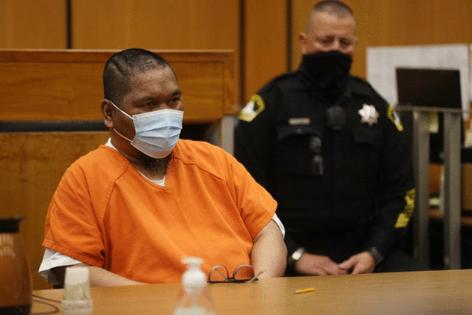Death penalty sought for man who admitted killing Sacramento police officer Tara O'Sullivan
Published in News & Features
SACRAMENTO, Calif. — Attorneys for the man who admitted to ambushing and killing Sacramento police officer Tara O’Sullivan as she attempted to help a woman collect her belongings from an abusive partner asked jurors on Wednesday to spare him the death penalty.
Adel Sambrano Ramos, 51, sat quietly, long hair pulled back in a ponytail and bouncing slightly in his chair as attorney Jan Karowsky said he would not dispute any of the facts in the case, and that he expected jurors to want to execute his client, as opening arguments in the penalty phase of the case began before Sacramento Superior Court Judge James Arguelles.
Ramos pleaded guilty on Aug. 30 to felony counts including murder with special circumstances for O’Sullivan’s slaying and attempted murder of another officer at the violent, bloody scene in Del Paso Heights in June 2019. He initially pleaded not guilty, but the trial was delayed as his attorneys argued that he was not mentally competent to stand trial.
Now, in a sentencing trial expected to last about three weeks, a jury must decide whether Ramos should be put to death. California has not carried out an execution since 2006, but capital punishment remains on the books. Gov. Gavin Newsom declared a moratorium on capital punishment in 2019, but a future governor or court decision could reinstate it.
Regardless, prosecutors said the sentence would send a powerful message and bring relief to the victims’ families.
O’Sullivan’s murder sent shockwaves through the capital region, and led the city to rename the H Street Bridge over the American River among memorials.
On Wednesday, prosecutor Jeffrey Hightower described O’Sullivan, who grew up in the Bay Area and graduated from a criminal justice program at Sacramento State, as a devoted young officer who even as a child displayed a keen sense of right and wrong. She was still in training when she urged her partner to respond to a call from Megan Jansa, who at the time lived with Ramos in the Redwood Avenue home she had inherited from her grandfather.
O’Sullivan didn’t have to go to that North Sacramento call, Hightower said, and it wasn’t clear at the time that Ramos had committed a crime, but she persuaded her training officer to pick it up.
She didn’t know, Hightower said and Jansa later described in testimony, that Ramos had kept Jansa up all night long with threats, saying he would kill her dogs, that he would kill her and bury her with a shovel he brought into the house. He had accumulated numerous firearms, among them assault weapons including one that he kept tucked into the waistband of his pants as he came in and out of the bedroom in a rage.
When O’Sullivan and other officers arrived at the house, hoping to help Jansa gather her belongings in safety, they found the front door barricaded, Hightower said, leading them to enter the property around the side. Ramos gave no indication he was there. He did not respond to their calls, including a statement from officers that they were not there to arrest him, Hightower said.
But as the team moved to check whether anyone was hiding in the detached garage, Ramos burst out and began firing, Hightower said. He shot O’Sullivan in the head and she went down.
He continued shooting at her, bullets stirring up dirt and debris as he aimed at her chest.
“Are you dead yet?” he yelled in a string of vulgarities, epithets and taunts that Hightower described and Karowsky did not dispute.
Once they’d heard all the evidence, Hightower said, jurors would see that the right choice would be to impose the death penalty.
But Karowsky asked jurors to consider the abuse and trauma that Ramos had suffered as a child in the Philippines before imposing such a harsh sentence.
The family was poor, he said, living with extended family in a home without running water. Ramos, one of four brothers, was beaten by his father for the smallest infractions, assaults that were worse when his dad was drunk. The father was stabbed to death by Ramos’ uncle when he was 5. The boy, who rushed into the room with family members, tried to stanch the bleeding with his own small hands, Karowsky said.
Later, he suffered abuse at the hands of relatives who were meant to take care of him after his mother left the Philippines to seek work in Hong Kong, Karowsky said.
Karowsky predicted that jurors’ instinct might be to impose the death penalty after hearing details of Ramos’ behavior.
“You’re going to be upset,” he told the jury. “You’re going to be angry. You’re going to want to make your decision right then and there.”
But Karowsky said he would bring witnesses, including family members, who would testify to Ramos’ childhood experiences and ask that his life be spared.
“Mr. Ramos is here today as a human being,” Karowsky said. “He’s pled guilty to all of his crimes.”
____
©2024 The Sacramento Bee. Visit at sacbee.com. Distributed by Tribune Content Agency, LLC.







Comments